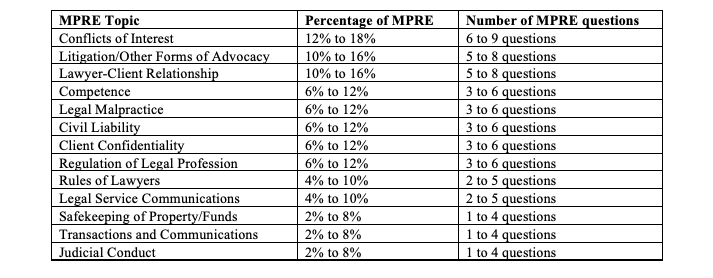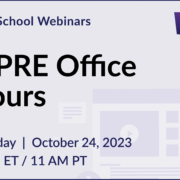10 Quick MPRE Tips
10 Quick MPRE Tips
There is a well-established approach to studying for the Multistate Professional Responsibility Examination, (aka the “MPRE”). Although similar to the bar exam, the MPRE differs from the bar exam because it only focuses on one topic – professional responsibility – and law students often take the exam before they graduate from law school. Here, we will share ten quick and helpful tips that will help you successfully study for the MPRE.
10 Quick MPRE Tips
1. Learn and memorize the rules of professional conduct before diving into practice questions.
It’s easy to briefly read the rules of professional conduct and jump right into taking MPRE practice exams. However, make sure you devote time to reading, understanding, and memorizing the rules of professional conduct before doing so. This ensures you know the rules, which will be important when you go in to take the MPRE!
Students often mistakenly think that the best way to learn is to start taking practice tests and that the necessary knowledge to pass the exam is very easy and straightforward. Additionally, many students think that practice questions will teach the student about the rules of professional conduct. While some students have certainly passed the MPRE using this approach, many students find they missed out on some material come test day.
While gaining familiarity with practice questions is essential preparation, it is not the best approach as you begin studying. After all, it’s hard to apply rules correctly when you haven’t studied them yet!
Instead, we recommend that you start the rules, an outline, or a lecture instead of the practice questions. The immediate benefit of this approach is that you can learn the rules in a more cohesive and organized way and helps you better understand how they fit together.
Starting with the material makes the process of learning and memorizing more of the rules much easier. For example, you can start studying by first focusing on the rules that deal with the regulation of the legal profession. Since there are multiple rules to learn, if you learn them rule by rule, you’ll have a better understanding of how they fit together. If you turn to practice questions first, you’re picking up these rules in pieces making them harder to memorize.
Looking for a quick start to learning the Rules of Professional Conduct? JD Advising offers a useful MPRE attack outline which is three pages long and helps set you up for MPRE success!
2. Review MPRE keywords and phrases.
MPRE questions tend to use similarly-worded calls of the question repetitively. Knowing how the National Conference of Bar Examiners (the “NCBE”) utilizes these words and phrases so you know what to expect can be useful.
“Is this lawyer subject to discipline?” is one example that often comes up in the MPRE. Other ways of asking this question include “is this lawyer subject to litigation sanctions?” or “is this lawyer subject to civil liability?” Knowing MPRE keywords and phrases helps to make the process of eliminating incorrect answers much simpler because you’ll know what “subject to discipline,” “subject to litigation sanctions,” or “subject to civil liability” all mean. Importantly, this provides you with a much clearer idea of what the NCBE is looking for in a correct response.
JD Advising has several resources that discuss MPRE keywords and phrases. This includes an in-depth blog post about the keywords and phrases, a discussion about keywords and phrases as part of JD Advising’s MPRE Guide, and an MPRE One-Sheet.
3. Spend your time wisely: learn highly tested topics.
If you have a limited amount of time to spend studying for the MPRE, it makes sense to get more bang for your buck by focusing on the most highly areas most likely to be tested. In fact, regardless of how much time you have to devote to MPRE studying, focus on the highly tested areas!
Our MPRE One-Sheet and MPRE Crash Course provide a breakdown of what topics are on the MPRE and further provides a percentage of how much of the MPRE is based on certain topic areas. To get a sneak peek, keep reading!
The MPRE tests several categories of professional responsibility rules. Below, we have ordered the MPRE topics in order from most tested to least tested.
Remember, the MPRE score is calculated based on 50 scored questions. This means that you can expect 6-9 questions to cover conflicts of interest. This means that you should make sure that you feel very familiar and comfortable with the conflicts of interest material since it makes up so many MPRE questions.
4. Use real MPRE practice questions.
There is no substitute for using real MPRE practice questions as you study for the exam. The NCBE periodically releases a number of previously-used MPRE questions. These questions are offered across various platforms for purchase: the NCBE sells these MPRE questions, and JD Advising also sells these MPRE questions.
The benefit of relying on real MPRE questions is that they are the most similar to the actual questions you will encounter on the MPRE. Why is this useful? It helps to familiarize you with the fact patterns the NCBE tends to use, the complexity and length of questions the NCBE tends to use, and the structure of the question the NCBE tends to use. This means you’re practicing with questions that are incredibly similar to what you see on the exam.
5. Answer practice questions slowly and methodically.
We know that this sounds like an obvious tip. However, after you spend sufficient time learning and memorizing the rules of professional conduct, we recommend that you do not immediately move on to timed MPRE practice questions or exams.
Answer the questions slowly at first. This will allow you to dissect the questions and allows you to better familiarize yourself with their structure. Also, taking a slow and methodical approach allows you to review the wrong answers to each question so that you become familiar with potential red herrings. After you have answered an MPRE practice question, review the wrong answers and see if you can explain to yourself why the particular answer choice was not the best answer choice. This approach to practice questions allows you to become comfortable with the MPRE questions. Likewise, be sure to review the explanation for the correct answer so you can ensure you answered the question correctly for the right reasons.
As you answer practice questions, keep the fact pattern in mind. Review the fact pattern again and identify which facts were outcome determinative and which facts were red hearings and totally irrelevant. This will clue you in on where you should be focusing.
6. Focus on the lawyer.
As you read through the MPRE question, focus on what the lawyer is doing in the fact pattern. After all, the MPRE tests the ethics of lawyers! The MPRE commonly asks questions where a non-lawyer is doing something that would be inappropriate if a lawyer were doing it. This non-lawyer party could be a paralegal, the client, or another third-party professional with whom the lawyer is working (such as an accountant). Many times, MPRE questions provide the examinee with information indicating that a non-lawyer party is doing something suspicious or unethical. However, remember, the MPRE is testing whether a lawyer’s actions are unethical – not the actions of a non-lawyer party.
This means that as you read fact patterns, look carefully at the lawyer. Evaluate the lawyer’s situation, actions, mindset, and conduct before deciding on an answer choice. This will allow you to determine whether the lawyer’s actions are inappropriate.
7. Answer the question before reviewing the answer choices.
Start with the fact pattern and the call of the question – then stop. Don’t read ahead to the answer choices. Cover up the answer choices with your hand if you’re tempted to sneak a peek!
Ask yourself what the answer to the call of the question is. To do this, knowing, understanding, and memorizing the rules of professional conduct is crucial. If you know the rules of professional conduct, you should be able to determine the correct answer to the question without relying on the answer choices.
Another way to think of this is that you should act like the question is a short answer question, where you would have to write a short response to the question. If, for example, the call of the question is “is this lawyer subject to discipline,” and you think the answer is yes, explain why this lawyer is subject to discipline to yourself. Then, uncover the answer choices and see if you can find an answer that mirrors your answer.
This process will keep you from being tricked by answer choices that might seem correct but that are actually inaccurate. By determining the correct answer before evaluating other answer choices, you are less likely to get persuaded by incorrect answers.
8. Eliminate incorrect answers.
This next quick MPRE tip is often undervalued. When you are at the point of reviewing answer choices, it is important to eliminate the answer choices that misstate the rule or misstate the fact pattern information. Here, again, having memorized the rules pays off because you will be able to more easily spot the answer choices that are inaccurate.
For example, one answer choice may provide that conduct is permissible if the client consents to the conduct in writing. However, the fact pattern may portray a scenario where the client cannot consent in writing to otherwise inappropriate conduct. Knowing the rules of professional conduct can help make determine whether an answer choice is incorrect straight-forward and simple.
9. Avoid “no harm, no foul” answer choices.
Avoid answer choices that say that the lawyer is not in trouble because the client did not suffer any harm. There are referred to as “no harm, no foul” answer choices, and they tend to be incorrect. On some level, “no harm, no foul” answer choices are intended to elicit an emotional response from the examinee because the client did not suffer any harm as a result of a lawyer’s conduct. However, oftentimes, the rules of professional conduct are enforceable irrespective of whether the client suffered harm.
One prime example is if a lawyer mishandles the client’s money, but at the end of the day, the client says that this is not a problem because they will get the money they are entitled to from the litigation. If the question asks whether this lawyer is subject to discipline, one of the incorrect answer choices will say something to the effect of “no, because the client still received their money.” However, misuse of the client’s money still means that the lawyer is subject to discipline, even though no harm occurred to the client! Beware of such answer choices!
10. Don’t forget about exceptions to the rules.
This is another concept that often appears as an incorrect answer choice. An often-misleading answer choice will list the general rule, which potentially sounds correct and is really tempting. You may even think you have identified the rule that the NCBE is testing and have found the correct answer choice! But, before you choose the answer choice that states the general rule, make sure to take a moment to evaluate whether there are any exceptions to that general rule of professional conduct and whether any of those exceptions may apply to the fact pattern. Sometimes even though a rule is correct, the question is testing an exception, so make sure to pay attention to this!
We wish you all the best of luck on the MPRE! Take a look at our many free MPRE resources, including an MPRE study schedule to help you maximize results, our MPRE course, and many other free MPRE resources.
Looking to Ace the MPRE?
- Enroll in our 5-star rated free MPRE Course, complete with expert guidance, an exclusive outline, practice questions, and a one-sheet.
- Tackle the Real MPRE questions — the gold standard for test preparation.
- Elevate your preparation with personalized MPRE private tutoring, featuring a tailored study plan and dedicated MPRE outline.
- Dive into our assortment of complimentary top-notch MPRE resources for your success.











Leave a Reply
Want to join the discussion?Feel free to contribute!